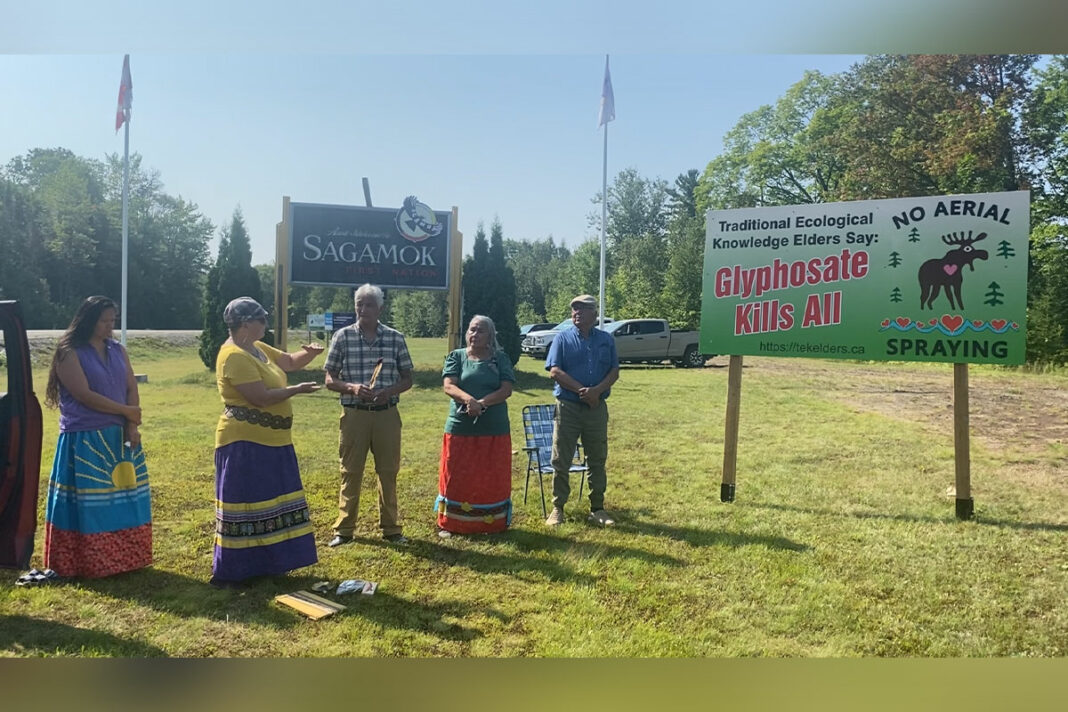SAGAMOK FIRST NATION—Traditional Ecological Knowledge (TEK) Elders have initiated a powerful education campaign aimed at ending the use of glyphosate-based herbicides in forestry. The campaign was launched with a ceremony in Sagamok First Nation, where TEK Elders gathered to unveil the first of twenty billboards that will be erected across the Robinson Huron Treaty lands. These billboards, featuring the message “Glyphosate Kills All,” alongside an illustration of a moose, are part of a broader effort to raise awareness about the harmful effects of glyphosate on the environment.
Elder Caroline Recollet of Wiikwemkoong, a spokesperson for the TEK Elders, emphasized the deep connection between the land and the health of Indigenous communities. “Ontario has an obligation to respect our treaty rights,” she stated. “When forests are converted to plantations, all life is affected – we share these lands with all Creation.”
Ms. Recollet reflected on her involvement in the movement, inspired by the work of Elder Raymond Owl, a co-founder of the TEK Elders Group. “I have a passion for this work, protecting the land,” she said. “I watched Ray from a distance when he got this TEK Elders work going over a decade ago… I feel called to the work that they were doing… our connection with the land, what happens to Mother Earth happens to our bodies, and we are all very sick.”
The TEK Elders have been advocating against the use of glyphosate in forestry for over a decade. They have observed alarming changes in the ecosystems, particularly the decline of moose, deer, muskrat, and other wildlife as glyphosate is used to convert mixed forests into jack pine plantations. The Elders have called for an immediate moratorium on glyphosate use, a stance supported by a 2017 declaration signed by 22 First Nation chiefs.
“The TEK Elders continue to uphold expert land-based Indigenous scientific knowledge on our traditional forests,” Ms. Recollet said. “We know that we are dependent on the health of Mother Earth. Our way of life comes from the lands, and if the lands are sick, so is all life. We are seeing increasing numbers of our people and animals dying from cancer, tumors and chronic diseases.”
Ms. Recollet described the devastating impact of glyphosate on forest ecosystems, contrasting the resilience of natural forests with the sterile, industrial landscapes created by plantations. “Native plants, important fungi, and bacteria are forever harmed from the poison sprayed on them and the soils, leaving a grey wasteland,” she explained. “This practice forever affects the ability of our First Nations communities to harvest the land as our ancestors did before us.”
The launch event in Sagamok First Nation was attended by several TEK Elders, including Grace Manitowabi of Sagamok, Joe Jones of Garden River, Evelyn Roy of M’Chigeeng, Martha Toulouse of Sagamok, and Mary Wemigwans of Nimkii Azhibikoong. They were joined by Sam Manitowabi from the Robinson Huron Waawiindimaagewin (RHW), Sagamok Councillor Nelson Toulouse and artist Christie Belcourt.
Sam Manitowabi expressed RHW’s support for the TEK Elders’ campaign, acknowledging the spiritual and environmental significance of their efforts. “Put our Semaa (tobacco) down and ask for our good intentions… there is going to come a time when Mother Earth is going to fight back,” he warned.
Elder Raymond Owl, speaking in both Anishinaabemowin and English, reinforced the urgency of taking action. “The time for meetings has come and gone,” he said. “Action is required to protect the forest for future generations.”
The TEK Elders’ campaign underscores the critical need to protect Indigenous lands from harmful forestry practices and to uphold the rights and knowledge of First Nations communities in managing their traditional territories.





